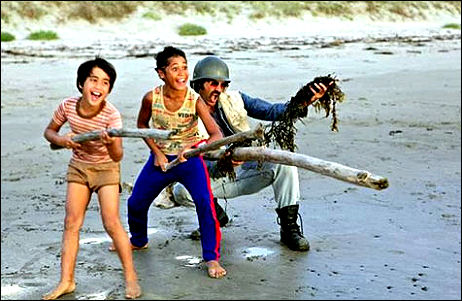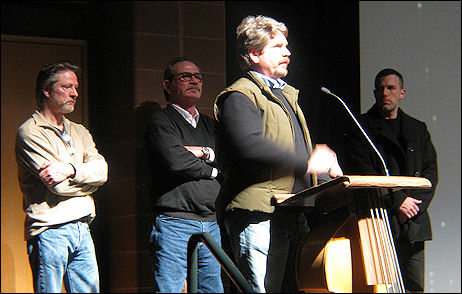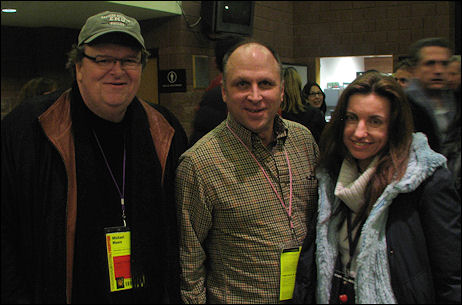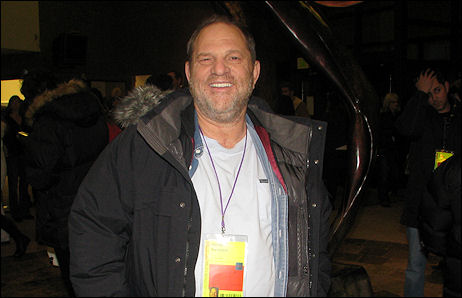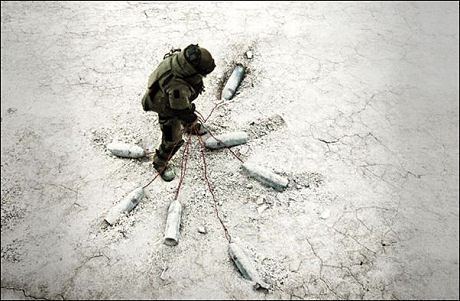My early-morning plan was to file a couple of short stories (which I did) and then dash over to the Holiday Cinemas for a 9:30 am screening of Amir Bar Lev‘s The Tillman Story (which I wrote about last week). But then a friend called from the Eccles saying he had an extra ticket to Philip Seymour Hoffman‘s Jack Goes Boating. For whatever reason I told him I’d be right over. I paid a cab driver six bucks for a ride that lasted 55 seconds.
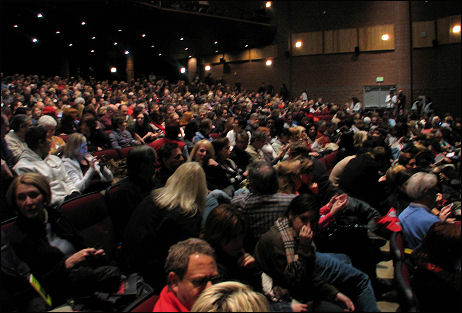
Eccles crowd just prior to showing of Philip Seymour Hoffman’s Jack Goes Boating — Sunday, 1.24, 9:25 am.
When I sat down I told my journalist pal I was a wee bit leery based on an age-old fear of first-time directing efforts by prominent actors, and especially those from the indie realm. (Obviously there have been welcome exceptions to the rule.) He mentioned that Jack Goes Boating hadn’t been slated for a press screening, and my heart sunk — I hadn’t noted that. Then the film began, and less than ten minutes later I was grumbling to myself. Four or five minutes later I got up and left.
Not because it was terribly made or horribly off its game — the opening established an amiable, easy-going tone with dabs of low-key humor — but because I really, really didn’t want to hang with Hoffman’s Jack, an oafish Manhattan limousine driver. Jack is pudgy — okay, fat — and rumpled and conversationally slow as molasses. He wears a dim and drowsy expression, and seems borderline stupid and to some degree emotionally shut down. “I don’t like this guy — he’s too doltish,” I muttered to myself. And the humor, as I heard it, conveyed a kind of low-energy flatness, reflecting the perceptions of people with somewhat diminished capacities.
And then came a scene between Hoffman and Amy Ryan, portraying a plain girl named Connie whom Jack is interested in, and costars John Ortiz and Daphne Rubin-Vega. It ends with Hoffman telling Ortiz that Ryan wants to go boating sometime, and Hoffman explaining that this might not work because he can’t swim. And then Ortiz mentions that he could teach Hoffman to swim at an indoor pool he’s been to.
That was it — I wasn’t going to watch Hoffman in bathing trunks. He’s been getting more and more corpulent lately, and it just makes me feel badly for the guy. I want him to be Capote-sized for the rest of his life. I’m sorry. I’m really not trying to be an asshole. It’s quite possible that Jack Goes Boating will be called a decent-enough film by critics and festivalgoers I respect. I just didn’t want to be in that world so I left.
I ran outside with the hope of catching The Tillman Story, which had only begun a few minutes earlier. A shuttle bus stopped but it wasn’t headed for the Holiday Cinemas. I stuck out my thumb and caught a ride. I ran into the theatre lobby about 20 minutes after the film had started, and was told by volunteers there was no room at the Tillman inn — every seat was taken. Defeat, despair. I walked over to the Yarrow and started to write some stories. And that’s where I am right now.






